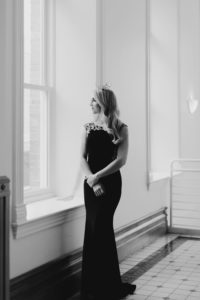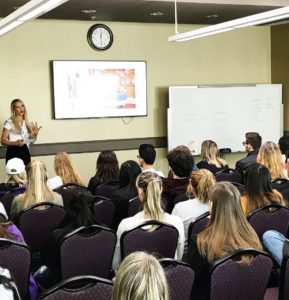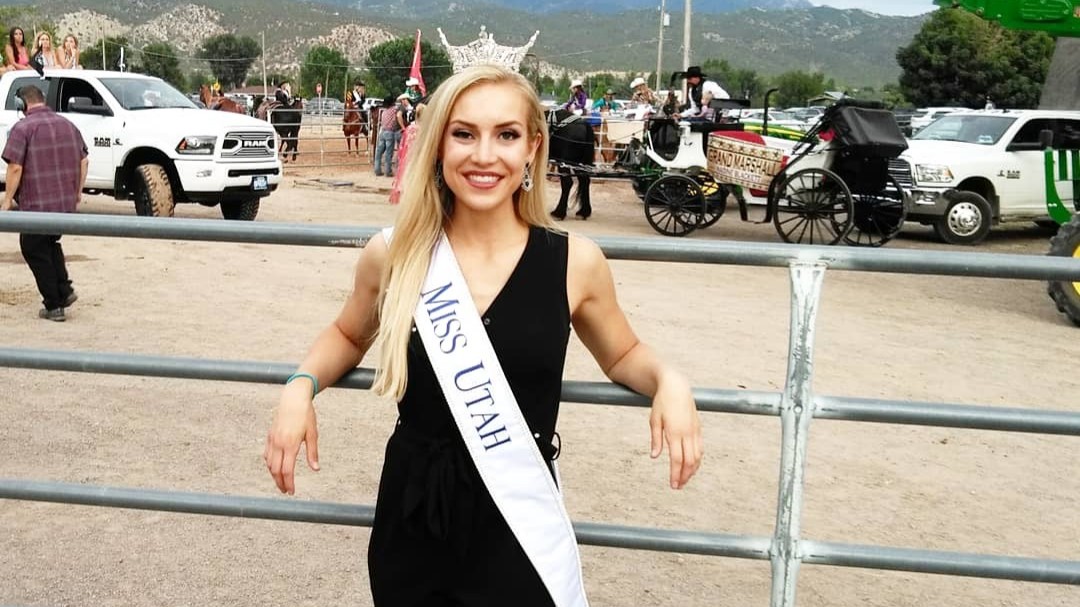On my Miss Utah resume, I included in my “Interesting Facts” section that I was an “extroverted introvert.” Some of my closest friends and family who helped me prepare for Miss Utah and Miss America questioned my decision:
“Judges might see that you being an introvert is a bad thing and that you won’t be able to handle the job.”
With the way society has misunderstood introverts, anyone who would proudly identify as an introvert would be seen as crazy. But I intentionally put that on my resume because it is an important — and now treasured — part of my identity that has shaped the type of leader and woman I am today.
The Truth About Introverts
I believe that this misconception comes from the fact that those in the spotlight are easier to understand simply because they are in the spotlight. For those who aren’t in the spotlight, it’s easier to write them off as shy than it is to realize that they might just be more comfortable with being a listener than a talker; it’s easier to assume someone lacks confidence than to recognize that confidence can be manifested in different ways. One-third to one-half of the United States population alone are introverts (Cain 2012) and how sad would it be if we said that all of those people had less value than extroverts?
Most introverts aren’t the type who just sit in a corner alone or who hate people: they are public speakers, scientists, and authors; they are J.K. Rowling, Albert Einstein, Rosa Parks, Michael Jordan, and so many more. Being an introvert or extrovert is on a spectrum which means you can never be fully introverted or extroverted — hence my self-proclaimed title of “extroverted introvert.”
Being the center of attention at a party or socializing in large groups of people isn’t my thing but I love public speaking and performing — it makes me feel alive. I love getting to know people and having in-depth conversations, but I also prefer to stay in on the weekends and to socialize in smaller groups of people.

One of my favorite quotes comes from Susan Cain’s book Quiet: “Introverts…may have strong social skills and enjoy parties and business meetings, but after a while wish they were home in their pajamas. They prefer to devote their social energies to close friends, colleagues, and family. They listen more than they talk, think before they speak, and often feel as if they express themselves better in writing than in conversation. They tend to dislike conflict. Many have a horror of small talk, but enjoy deep discussions.”
Including this part of my identity on my resume was initially not easy; it has been the one facet of my personality that I’ve struggled the most to accept throughout my life.
Growing up, people labeled me as the “shy girl” and as “quiet.” I don’t blame people for not really understanding me — we naturally compartmentalize different types of people, things, and places in order to better understand our world. But I think what the world has begun to realize is that stereotypes are outdated. Yes, some people might conform to the stereotype, but reducing a whole group’s identity to a stereotype is a cop-out; it’s a way of telling ourselves that we know our world without ever investing the time and energy required to understand it.
People aren’t like fruits and vegetables stacked neatly in a grocery store; introverts aren’t peaches and extroverts aren’t broccoli because that’s way too simple! I like to think of people as painted masterpieces brimming with colors: we have different shades, textures, and meanings. One person might interpret us one way where another person will interpret us in a completely different way.
My Journey
It makes sense why we would think of people that way though. Our first lessons in school were differentiating shapes, colors, and tastes. That’s why I don’t begrudge anyone who has attached negative connotations to introvert — it’s what we’ve learned to do!
But I’ll never forget those times where I would come home crying to my mom because of the girls in middle school who would make fun of me for being quiet or for asking what my problem was. The condescending words, smiles, and the memory of my orchestra teacher shushing our class before I spoke to say, “guys, she’s really quiet” are memories I’ve never forgotten.

I desperately wanted to change myself in order to fit what I believed to be the ideal; I believed that I needed to be an extrovert in order to be successful. In high school, I even convinced myself that I was an extrovert. I took the color personality test and made myself believe that the “yellow” attributes fit who I was because I felt like I had to embody an extrovert in order to be an exemplary leader.

When I got to college, I began to realize that I had mistakenly judged who I was. I got repeatedly frustrated when my extrovert mask began to crack and people saw the introvert underneath; I felt like I had let myself down because I hadn’t maintained the facade I had come to believe was my identity. But then, one day, I stopped trying to fit into a cramped extroverted box that refused to fit Jesse Craig.
I realized that I preferred my alone time on the train that took me to school, in fact, I looked forward to being alone with my thoughts and a book. I didn’t mind sitting alone in the cafeteria between classes — I didn’t feel embarrassed or ashamed that people would see me alone. And even though I was terrified to take on a director position at the University of Utah, I began to recognize the strengths that I had simply by being who I was. My peers and coworkers respected me and my opinions even though I presented them in different ways. I was a good listener, I planned ahead, I cared about others’ ideas and perspectives, I was independent, and I was confident.
Miss Utah
Before becoming Miss Utah I was also terrified because I used to believe that in order to be a good Miss Utah that I had to act like an extrovert. But you know what? That’s absolutely untrue. As I have interviewed former Miss Utah’s and volunteers over the past year, I have met people of all personality types. I think back over the years and there were so many Miss Utah’s who were extroverts and introverts; each became successful because of the powerful woman she was and the confidence each possessed.
One of my favorite appearances as Miss Utah was in November. I was asked to give a seminar with a topic of my choice and I almost immediately knew that I wanted to have it center on leading as an introvert. That day was so special to me because as I spoke of my experiences and, most importantly, the strengths that me and my fellow introverts embodied, I could feel a collective sigh of relief and a deep exhale of “thank you.”

We had all been made to feel that something was wrong with us simply because we didn’t have to or want to be the center of attention; our abilities to find comfort in thinking before we spoke, spending time alone, and being good listeners were reduced to mere “quietness.” After the seminar, I hugged some of my peers who were emotional and told me how much it had meant to know they weren’t alone.
In that moment, I realized that being an introvert as Miss Utah could be one of my greatest assets. I knew that there were so many people out there who had been misunderstood just like me and needed to know that being an introvert can become one of your biggest strengths.
In my Miss America interview, one of my judges did end up asking how being an introvert would affect my performance as Miss America. When I answered, I felt confident and proud to state who I was. I no longer felt defensive or ashamed because I know that my personality traits are my strengths. Being an introvert has helped me to become more invested in the people I meet with every day, to plan ahead, to listen to others, and more. Whether you are Miss Utah, President of the United States, a CEO, a lawyer, etc., it doesn’t matter if you’re an extrovert or introvert. I’m proud of who I am, and as Miss Utah, one of my main objectives is to help others realize that they are good enough just the way they are.

Awesome article. Love the strength you have of embracing who you are. Love you!
Thanks mom! Love you!
Wow! Life changing concept if you are an extroverted introvert. Thank you for this.
Thank you so much, Kaiti! I love you.
What a powerfull message! Nobody even told me during my life. With this point of view, I even feel like forgiving my bullies in the past. They didn’t get my point of view, as much as I didn’t get their point of view. Although I think respect should be a resolution, nobody can help it when you don’t understand someone else, because we are all different.
Thank you for this powerfull message❤